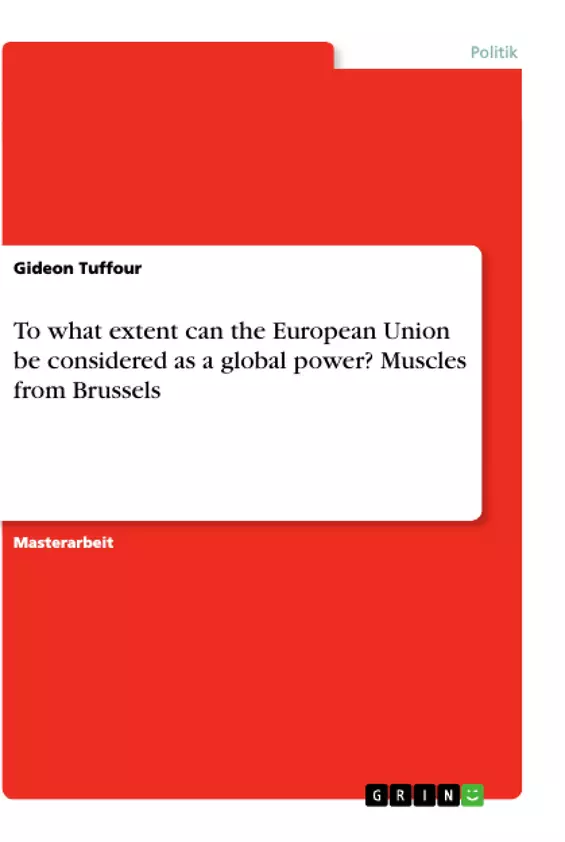The work identified types of powers and the kinds that the EU utilizes in its international relations. Thought-provoking information was unearthed from the EU's trade deals with several states worldwide, the EU's humanitarian/developmental aid, and its global advocacy and leadership in global environmental sustainability. Compared to the USA, the EU was the current global power; the partnership, differences, and challenges between the EU-USA relationship in the international space were then identified and explained. The general analysis of the information and data gathered was then discussed.
The European Union was formed after 1957 during Rome's Treaty with only six European heads of state. The EU has now grown with twenty-seven States, thereby making the EU sui generis. Some analysts and scholars term the EU as a super-state, and others term the EU as worthy of being a global power. This work will analyze the features and actions of the EU and will find out if the EU can be considered as a global power in these modern times. Using Realism, Liberalism, and Socio constructivism as the theoretical framework.
The study employs a mixed-method design; more qualitative data was used than quantitative data. The sources of data for both qualitative and quantitative design for the work were retrieved from the websites of the Organization for Economic and Development (OECD), the European Union, the European Commission, and the European Council. Secondary sources include newspapers, online journals, online newsfeeds, journal articles, academic books, essays, and textbooks. All these sources helped in answering the research question and drawing a definite conclusion for the work.
Inhaltsverzeichnis
- Abstract
- Acknowledgements
- List of Abbreviations
- Chapter 1: Introduction
- 1.1: Background to the Study
- 1.2: Research Questions
- 1.3: Research Objectives
- 1.4: Significance of the Study
- 1.5: Theoretical Framework and Research Methodology
- 1.6: Organization of the Study
- Chapter 2: Literature Review
- 2.1: Concept of Power
- 2.2: The European Union: A Historical Perspective
- 2.3: The Evolution of the EU's Foreign Policy
- 2.4: The EU and Global Power: Theories and Perspectives
- Chapter 3: The EU's Instruments of Power
- 3.1: Economic Power
- 3.2: Political Power
- 3.3: Soft Power
- Chapter 4: The EU's Role in Global Affairs
- 4.1: The EU and International Organizations
- 4.2: The EU and Global Governance
- 4.3: The EU and Global Security
- Chapter 5: The EU and the United States: A Comparative Analysis
- 5.1: The EU-US Partnership
- 5.2: Differences and Challenges in the EU-US Relationship
- Chapter 6: Conclusion
Zielsetzung und Themenschwerpunkte
Diese Masterarbeit untersucht die Frage, inwieweit die Europäische Union (EU) als globale Macht betrachtet werden kann. Sie analysiert die Merkmale und Aktionen der EU, um zu ermitteln, ob die EU in der heutigen Zeit als globale Macht angesehen werden kann. Die Arbeit stützt sich auf die theoretischen Rahmenwerke des Realismus, Liberalismus und des Sozialkonstruktivismus und verwendet ein Mixed-Method-Design. Die Untersuchung basiert auf qualitativen und quantitativen Daten, die aus verschiedenen Quellen wie der Organisation für wirtschaftliche Zusammenarbeit und Entwicklung (OECD), der Europäischen Union, der Europäischen Kommission und dem Europäischen Rat stammen.
- Die Definition von Macht und ihre verschiedenen Formen
- Die Geschichte der EU und die Entwicklung ihrer Außenpolitik
- Die Instrumente der Macht, die die EU einsetzt, darunter wirtschaftliche, politische und soft power
- Die Rolle der EU in globalen Angelegenheiten, einschließlich internationaler Organisationen, globaler Governance und globaler Sicherheit
- Ein Vergleich der EU und der USA als globale Mächte, einschließlich der Partnerschaft, Unterschiede und Herausforderungen in der EU-US-Beziehung
Zusammenfassung der Kapitel
Kapitel 1 stellt die Forschungsfrage und die Forschungsziele vor. Es beschreibt die Relevanz der Forschung und erläutert die theoretischen Rahmenwerke sowie die Forschungsmethodik. Kapitel 2 bietet einen Überblick über die einschlägige Literatur zum Thema globale Macht und analysiert die Entwicklung der EU und ihrer Außenpolitik. Kapitel 3 untersucht die verschiedenen Instrumente der Macht, die die EU in ihren internationalen Beziehungen einsetzt, einschließlich wirtschaftlicher, politischer und soft power. Kapitel 4 analysiert die Rolle der EU in globalen Angelegenheiten, wobei der Schwerpunkt auf den Beziehungen der EU zu internationalen Organisationen, globaler Governance und globaler Sicherheit liegt. Kapitel 5 bietet einen Vergleich der EU und der USA als globale Mächte und untersucht die Partnerschaft, Unterschiede und Herausforderungen in der EU-US-Beziehung.
Schlüsselwörter
Die wichtigsten Schlüsselwörter dieser Arbeit sind: Europäische Union, globale Macht, Realismus, Liberalismus, Sozialkonstruktivismus, Wirtschaft, Politik, Soft Power, internationale Beziehungen, globale Governance, Sicherheit, USA.
Häufig gestellte Fragen
Kann die EU als globale Macht bezeichnet werden?
Die Arbeit analysiert dies anhand von Handelsabkommen, humanitärer Hilfe und der Führungsrolle beim Umweltschutz. Einige Forscher sehen sie als "Superstaat" oder "sui generis" Macht.
Was ist der Unterschied zwischen Hard Power und Soft Power bei der EU?
Während Hard Power militärische Stärke bedeutet, nutzt die EU vor allem Soft Power (Diplomatie, Kultur) und ökonomische Macht, um globalen Einfluss auszuüben.
Wie unterscheidet sich die EU von den USA als Weltmacht?
Die Arbeit vergleicht die Ansätze beider Akteure und beleuchtet die Partnerschaft sowie die Herausforderungen in der transatlantischen Beziehung im internationalen Raum.
Welche theoretischen Rahmenwerke werden genutzt?
Die Analyse stützt sich auf die Theorien des Realismus, Liberalismus und Sozialkonstruktivismus.
Welche Rolle spielt die EU in der globalen Governance?
Die EU agiert als wichtiger Akteur in internationalen Organisationen und setzt Standards in Bereichen wie Welthandel und ökologische Nachhaltigkeit.
- Citar trabajo
- Gideon Tuffour (Autor), 2021, To what extent can the European Union be considered as a global power? Muscles from Brussels, Múnich, GRIN Verlag, https://www.grin.com/document/1006997



